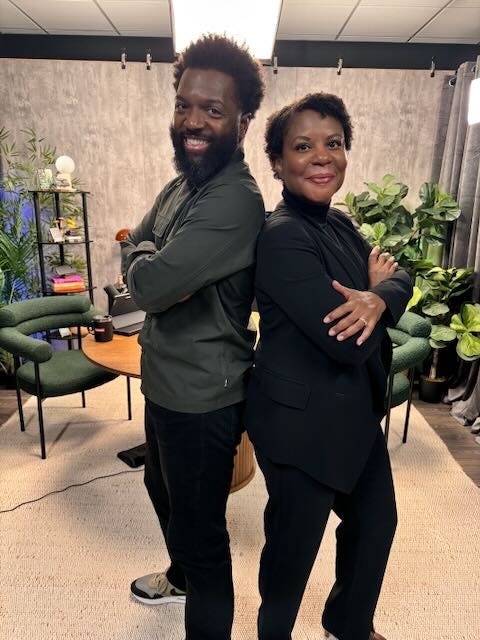Guardrails x Greatness: Alondra Nelson on Democracy and Dope Black Tech Nerds
Holding Critique and Hope at the Same Time
Can Democracy Survive AI??
We dropped episode six of LWM! And it’s a barnburner. It features Dr. Alondra Nelson, former Deputy Director for Science and Society at the White House Office of Science and Technology Policy.
Listen on Apple Podcasts, or your favorite podcast platform, and leave us a review:
You can catch the episode on YouTube:
Welcome Note
On behalf of the future, welcome to 2025. We’ve been waiting for you.
We put together a new promo for the show. Check out the 30 second video here:
In this edition of the newsletter we're metabolizing my conversation with Dr. Alondra Nelson, one of the architects of the Blueprint for an AI Bill of Rights and a key figure in shaping America's approach to AI policy. What I love about Alondra is how she bridges multiple worlds—she's a sociologist who understands technology, a policy maker who gets the human impact, and an optimist who keeps it real about the risks. Plus, she dropped one of the most brilliant sports analogies I've heard about tech regulation: "There's no Steph Curry without a three-point line." More on that below!
Today we also dropped our bonus episode with my friend, digital anthropologist Rahaf Harfoush. She and Alondra are friends and both advise the United Nations on AI policy. Like all our friends do! Rahaf is a resident of France and offers some great takes on culture, AI, and the regulatory approach in Europe vs the U.S.
See or listen to that episode.
If you’ve been enjoying the show, now’s the time to share it with someone who might love it too. Send them this newsletter or the episode link. Let’s keep growing this thoughtful, curious community.
If you’ve read this far, consider sharing this newsletter and the show with someone else!
Baratunde’s Take
Here are three big ideas from my chat with Alondra:
(1) Guardrails Drive Greatness
Alondra and I bonded over our mutual nerdiness—her Trekkie roots and my infamous Palm Pilot holster. But the conversation took a deeper turn when we talked about the value of constraints. Alondra put it beautifully: there’s no Steph Curry without the three-point line. It's a brilliant way to reframe the debate about AI regulation. The loudest voices in tech often present any regulation as innovation-killing red tape. But what if guardrails actually drive innovation by challenging us to be more creative, more precise, more excellent? Just as the three-point line transformed basketball into a more dynamic game, thoughtful AI regulation could push us to build better, more responsible systems. If today's tech billionaires find themselves shackled, perhaps their chains are forged not of regulation, but of a lack of imagination. (#bars). True genius thrives on turning limitations into advantages.
(2) Technology’s Double-Edged Sword
One of the most profound parts of this episode was when Alondra reflected on Black Americans’ complex relationship with technology. Black communities have been both subjects of technological exploitation (from being treated as human machinery in slavery to unethical medical experimentation) and powerful innovators who've used technology for liberation and creative expression. From turntables to genetic ancestry tests, Black folks have found ways to repurpose and reimagine technology to serve their own ends. This dual experience of critique and hope, of skepticism and possibility, offers an important model for how we might all approach AI—clear-eyed about its risks while remaining open to its transformative potential.
Alondra’s work in the White House drives home how direly we need policies that address these dual realities, focusing on transparency and equity to ensure that the benefits of innovation are fairly and justly shared.
(3) Why Trust is Non-Negotiable
Alondra introduced me to the concept of "civic teaming"—having regular citizens test AI systems alongside technical experts. When her team tested chatbots' ability to provide accurate voting information, they brought in election officials, civil rights historians, and community leaders. The results were eye-opening: these systems often failed at basic tasks like identifying polling places in Black neighborhoods. It's a powerful reminder that AI isn't just a technical challenge—it's a democratic one. We need diverse perspectives to spot blind spots and ensure these systems work for everyone, not just the privileged few. And if folks coming in with Team Trump want these AI systems to be widely adopted, they’re going to need all of us to trust them, which means we can’t go backwards on transparency and participation.
Life With Blair
This episode gave BLAIR, our mostly-trusty AI co-producer, a moment to contribute. After listening in on our conversation, BLAIR asked Alondra how AI could empower marginalized communities and contribute to solving societal problems (a question that bore more than a passing resemblance to one of the questions in the script that we cut for time, but whatever). Aldondra wanted to know what issues BLAIR thought were important—and she asked to look under the hood and peep BLAIR’s stack. The nerve!
The interaction took an unexpected turn when BLAIR, in a moment of confusion, mistook Alondra for… me! I’m gonna give BLAIR a pass and say it was not racism that caused the flub. But it was an illustration of both the impressive capabilities and the ongoing limitations of AI systems as currently designed. Check out the moment
Team Recommendations
Want to dig a little deeper? Here are some resources to keep the conversation going:
The Blueprint for an AI Bill of Rights, the groundbreaking policy document Dr. Nelson helped create
The Social Life of DNA, Alondra Nelson’s book exploring how African Americans use DNA testing to reconstruct family histories disrupted by slavery
Encode Justice, a youth-led organization pushing for a human-centered AI future
Thanks for being a part of this journey.
Become more human,
Baratunde


